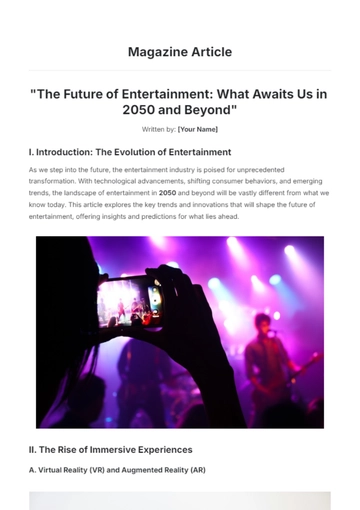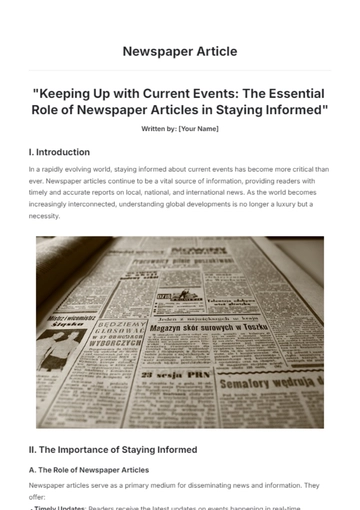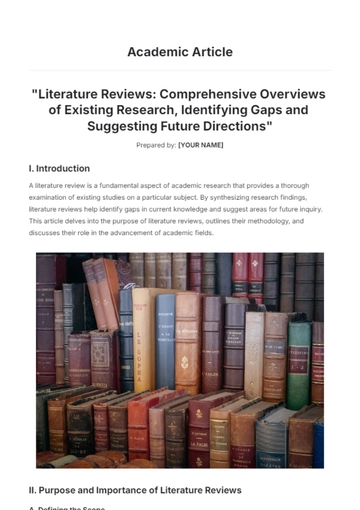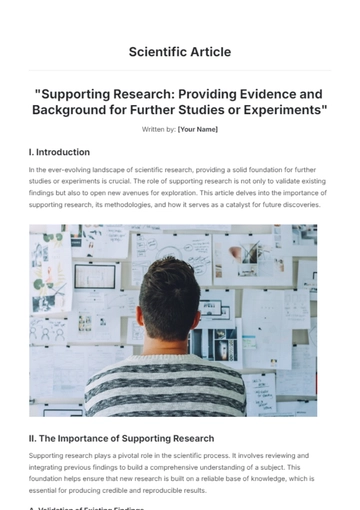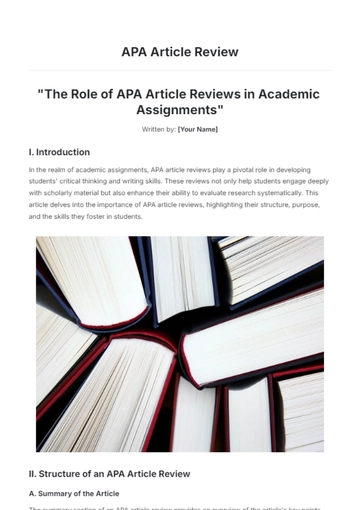Free Opinion Journal Article

Prepared by: [Your Name]
Date: [Date]
1. Introduction
Artificial Intelligence (AI) has increasingly become a transformative force in various sectors, with healthcare being one of the most promising fields for its application. This opinion article explores the profound impact AI is having on the healthcare industry, examining both the opportunities and challenges it presents. By analyzing current trends, potential benefits, and concerns, we aim to offer a comprehensive perspective on how AI is shaping the future of healthcare.
2. The Promises of AI in Healthcare
2.1 Enhanced Diagnostic Accuracy
AI systems have demonstrated remarkable capabilities in improving diagnostic accuracy. Advanced algorithms can analyze medical images, detect patterns, and identify abnormalities with high precision. For example:
Radiology: AI tools like deep learning models can enhance the interpretation of X-rays and MRIs, identifying conditions such as tumors or fractures that might be missed by human radiologists (Liu et al., 2056).
Pathology: AI algorithms assist in analyzing biopsy samples, providing faster and more accurate diagnoses for various cancers (Cireşan et al., 2050).
2.2 Personalized Treatment Plans
AI contributes to the development of personalized treatment plans by analyzing vast amounts of patient data. Key areas include:
Genomics: AI can process genetic information to tailor treatments based on an individual's genetic makeup, improving outcomes and minimizing adverse effects (Topol, 2056).
Drug Development: Machine learning models predict how different drugs interact with biological systems, accelerating the discovery of effective treatments (Vamathevan et al., 2056).
2.3 Operational Efficiency
AI enhances operational efficiency in healthcare settings by optimizing administrative and logistical processes:
Scheduling and Resource Management: AI systems streamline appointment scheduling, manage patient flow, and optimize the allocation of medical resources.
Administrative Tasks: Automating routine tasks such as billing and record-keeping reduces administrative burden and frees up time for healthcare professionals.
3. Challenges and Ethical Considerations
3.1 Data Privacy and Security
The integration of AI in healthcare raises significant concerns regarding data privacy and security:
Patient Data Protection: Ensuring the confidentiality of sensitive health information is paramount. AI systems must adhere to stringent data protection regulations to prevent breaches.
Consent and Transparency: Patients need to be informed about how their data is used by AI systems and provide explicit consent for its use.
3.2 Algorithmic Bias and Fairness
AI algorithms are susceptible to biases that can impact healthcare outcomes:
Bias in Training Data: AI systems trained on biased datasets may produce skewed results, potentially exacerbating health disparities among different populations.
Equitable Access: Ensuring that AI tools are accessible to all patients, regardless of socioeconomic status, is essential to avoid widening existing inequalities.
3.3 Accountability and Decision-Making
Determining accountability for AI-driven decisions in healthcare can be complex:
Clinical Responsibility: Establishing who is responsible for decisions made by AI systems—whether it is the AI developers, healthcare providers, or institutions—is a critical issue.
Quality Control: Continuous monitoring and validation of AI systems are necessary to ensure their reliability and effectiveness in clinical practice.
4. The Future of AI in Healthcare
4.1 Innovations on the Horizon
Several promising innovations are expected to further enhance the role of AI in healthcare:
AI in Robotics: Advanced robotics powered by AI are anticipated to revolutionize surgical procedures, offering greater precision and reducing recovery times.
Predictive Analytics: AI will play a crucial role in predicting disease outbreaks and managing public health responses through sophisticated data analysis.
4.2 Building Trust and Collaboration
To maximize the benefits of AI in healthcare, fostering trust and collaboration among stakeholders is crucial:
Engaging Healthcare Professionals: Involving clinicians in the development and implementation of AI tools ensures that they meet practical needs and are effectively integrated into clinical workflows.
Public Engagement: Educating patients and the public about AI's role in healthcare can build confidence and acceptance of these technologies.
5. Conclusion
AI holds tremendous potential to transform healthcare by enhancing diagnostic accuracy, personalizing treatments, and improving operational efficiency. However, addressing challenges such as data privacy, algorithmic bias, and accountability is essential to ensure the equitable and effective use of AI technologies. As we look to the future, ongoing innovation and collaboration will be key to unlocking the full potential of AI in healthcare and achieving better outcomes for patients worldwide.
6. References
Cireşan, D. C., Giusti, A., Gambardella, L. M., & Schmidhuber, J. (2050). Mitosis detection in breast cancer histology images with deep neural networks. Medical Image Analysis, 17(8), 672-684.
Liu, X., Zheng, Y., & Zhang, S. (2056). A survey of deep learning methods for medical image analysis. Artificial Intelligence Review, 52(3), 2025-2047.
Topol, E. J. (2056). Deep medicine: How artificial intelligence can make healthcare human again. Basic Books.
Vamathevan, J., Clark, D. A., Czodrowski, P., Dunham, I., & Ferran, E. (2056). Applications of machine learning in drug discovery and development. Nature Reviews Drug Discovery, 18(6), 463-477.
- 100% Customizable, free editor
- Access 1 Million+ Templates, photo’s & graphics
- Download or share as a template
- Click and replace photos, graphics, text, backgrounds
- Resize, crop, AI write & more
- Access advanced editor
Transform your insights with the Opinion Journal Article Template from Template.net. This fully customizable and editable template lets you tailor content effortlessly. Designed for flexibility, it’s editable in our Ai Editor Tool, ensuring a polished and professional finish. Perfect for crafting compelling articles that capture and convey your unique perspective.









